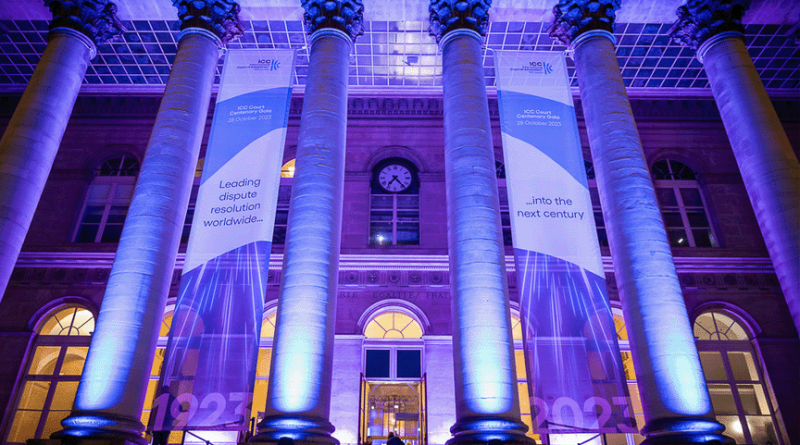Leading dispute resolution worldwide
Ashleigh Brocchieri is an Expert Counsel at ICC International Court of Arbitration
1923. The Hollywood sign is erected in Los Angeles, the first ball is thrown in Yankee Stadium in New York, and on 19 January 1923 in Paris, France the International Court of Arbitration® of the International Chamber of Commerce was founded. As the Hollywood sign is to film and the Yankee Stadium is to baseball, the ICC Court is as relevant to the business community today as it was 100 years ago.
World peace through world trade
The International Chamber of Commerce was created in 1919, in the aftermath of the devastation of the first world war. It was the brainchild of a group of entrepreneurs, known as the Merchants of Peace, including the then French Minister of Commerce Etienne Clémentel.
Armed with the belief that nations with strong economic ties do not go to war, the Merchants set out to foster world peace. They believed that to achieve peace, it is the private sector, rather than governments, who are best placed to set global standards and guidelines for commerce.
Just four years later, in 1923, the ICC Court was founded. The aim of the ICC Court then was, and today remains, to provide access to justice and the rule of law to everyone, every day, everywhere.
Who is the ICC Court?
The ICC Court is not the traditional court you would imagine watching courtroom dramas. The ICC Court does not itself settle disputes, but it exercises supervisory authority to monitor the proceedings of disputes in application of the ICC Rules of Arbitration, independent of any national court or other political involvement.
The ICC Court monitors the entire procedure, from the filing of the request for arbitration, through the constitution of the arbitral tribunal, the financial aspect of the arbitration, to the scrutiny of the award and beyond to assist parties in complying with formalities for the enforcement of the award.
The ICC Court is led by a President, who serves on a once renewable three-year term. The President, along with 17 Vice Presidents and 195 members from 121 countries around the world, make up the ICC Court. The ICC Court is supported by the Secretariat of the ICC Court, led by its Secretary General, to ensure the efficient administration of ICC arbitration.
The Secretariat comprises 12 case management teams, each dealing with a different geographical region or jurisdiction, and a 13th floating case management team to support the 12 aforementioned teams. The ICC Court and Secretariat of the ICC Court are made up of qualified lawyers with expertise in international arbitration and dispute resolution and professional support personnel.
The Court takes all administrative decisions necessary during the arbitration, whilst the Secretariat is the parties’ day-to-day point of contact for any assistance required during the arbitration or for any explanation as to the functioning of the ICC Rules.
With Court members from 121 countries, the ICC Court can leverage its experience in almost all jurisdictions around the globe to give its users an unparalleled service
The first cases
The first arbitrators were not the legal professionals we see today. They were experts in the subject matter of the dispute, engineers, businesspeople or members of local chambers of commerce originating from many jurisdictions already. The disputes very often concerned the quality of goods sold, including rubber, oil and other commodities, with the arbitrator being required to examine the goods in person.
The awards rendered were also very short, being just a few pages in length. The cases changed very rapidly in terms of legal and factual complexity. In the 1930s cases involving agency and licencing, for example, began to appear.
Today, arbitrations vary greatly from case to case but in general are much more complex than 100 years ago. Transactions involving multiple parties, multiple contractual documents, multiple external stakeholders from the private or public sectors including States, across multiple jurisdictions and with differing business models lead to more complex disputes. The ICC Court has filed over 28,000 cases.
Today, approximately one-third of ICC arbitrations involve multiple parties or contracts. In 2022, only 20% of ICC arbitrations concerned the sale and purchase of goods. 24% of cases involved the construction and engineering sector and 21% concerned the energy sector.
Evolution of the ICC Rules
The ICC Rules provide a framework within which parties can resolve their disputes. As the way the world conducts business has evolved, as have the ICC Rules to ensure they are primed to deal with new and challenging issues. There have been 14 versions of the ICC Rules, with the most recent being published in 2021.
As noted in the foreword to the 1998 version of the ICC Rules, which sentiment remains relevant today, “The changes made are designed to reduce delays and ambiguities and to fill certain gaps, taking into account the evolution of arbitration practice. The basic features of the ICC Arbitration system have not been altered, however, notably its universality and flexibility, as well as the central role played by the International Court of Arbitration in the administration of arbitral cases.”
The first version of the Rules, published in 1922, comprised three sections. The first section contained Conciliation Rules. The second and third sections contained the Arbitration Rules. This showed the importance of amicable dispute procedures from the outset. As Emmanuel Jolivet, ICC and ICC Court General Counsel observed “by providing flexible and comprehensive rules covering the whole range of dispute resolution mechanisms ICC has been a pioneer in the dispute resolution field for a century.”
Conciliation remained at the forefront of the ICC Rules until 1988, when the arbitration rules became their own document. That is not to say the emphasis on amicable dispute resolution waivered. Quite the opposite, in 1972 ICC established the ICC International Centre for ADR, a dedicated department focussing on amicable dispute resolution.
In addition to dealing with the administration of mediation and appointment of mediators, the Centre now also offers services in Expertise, Dispute Boards and Docdex, a bespoke dispute resolution tool for documentary instruments such as letters of credit.
The first version of the Rules, published in 1922, did not contain what is now the hallmark of ICC Arbitration: scrutiny of awards. However, it did not take the founders long to appreciate the benefit users would gain from this and as early as 1923 commentary noted that draft awards should be submitted to the ICC Court for examination.
In these early days, the examination was limited to the form of the award. It was 10 years later, in 1933, that the scrutiny of awards extended to drawing an arbitrator’s attention to points of substance of awards – while never fettering the arbitrator’s liberty of decision making.
Through the scrutiny process, the ICC Court ensures that the draft award has clear reasoning and that it addresses parties’ claims and defences, as well as considering any requirements of laws of the place of arbitration, when practicable. All with the ultimate goal of ensuring the enforceability of the award.
In response to parties’ desire for an efficient procedure to allow emergency measures outside of national courts, in 2012 the ICC Rules introduced Emergency Arbitration. The procedure offers the possibility of obtaining emergency relief, in the form of an order, for parties unable to await the constitution of the arbitral tribunal.
The ICC Rules have not only evolved to cater for complex disputes, in 2017, ICC introduced the Expedited Procedure Provisions (“EPP”). Intended for disputes where the amount in contention is under US$ 2,000,000, increased to US$ 3,000,000 in the 2021 Rules, EPP offers a simplified procedure at a reduced cost where the final award may be rendered within six months from the case management conference.
In these cases, the arbitral tribunal, after consultation with the parties, may decide the dispute on documents only or limit the parties’ written submissions and witness evidence.
The 2017 Rules introduced the possibility for the Court to communicate reasons for certain decisions. With the aim of fostering transparency, another wish from users, any party may request that the ICC Court communicate its decisions on its prima facie jurisdiction, consolidation, arbitrator challenges or replacement of arbitrators.
Servicing our users over 100 years
ICC’s role as service provider has underpinned its user offerings over the past 100 years. As the ICC Court’s global reach has expanded, as has its range of services.
Inaugurated and headquartered in Paris, the ICC Court now operates from offices in five regions. ICC opened its first overseas office in Hong Kong in 2008. This was followed by an office in New York in 2014, Sao Paulo and Singapore in 2018 and Abu Dhabi in 2021. Being present in all time zones affords ICC the unique position of having a truly global reach, with a regional presence.
The ICC Court continuously strives to keep up to the demands of parties. At the time of publishing the 1988 Rules of Arbitration, the Court would meet in principle once a month. Now the Court meets at a minimum once a week, in English and French, with additional sessions in Spanish, Portuguese and German. 299 Court sessions were held in 2022.
With Court members from 121 countries, the ICC Court can leverage its experience in almost all jurisdictions around the globe to give its users an unparalleled service.
The world since 1923 has changed drastically and no more so than the way global business can leverage technology. In October 2022, ICC launched ICC Court Connect, a pioneering digital case management platform to connect parties, arbitral tribunals and the ICC Secretariat.
ICC Case Connect enables parties, via their business and/or legal representatives, to streamline communication and file-sharing and provides a convenient platform to view their current or closed ICC Case Connect arbitrations.
In June 2023, ICC announced its intention to develop the next version of its digital case management platform. As articulated by Francesca Hill, Head of Operations for ICC Dispute Resolution Services, this “will enable ICC to continuously improve our range and delivery of digitally-enabled dispute resolution services for the future.”
ICC as a global leader
According to the Queen Mary University of London Survey on International Arbitration, ICC is the world’s most preferred and/or used arbitral institution by global stakeholders. ICC’s Dispute Resolution Services offering to the international business community is not limited to the administration of their arbitration proceedings.
Created in 1920, the ICC Constitution and Commission on Arbitration, now known as the Commission of Arbitration and ADR, is the ICC ‘legislative’ body. It drives thought leadership by studying international dispute resolution and producing reports and guidelines on legal and procedural aspects of dispute resolution.
The commission’s membership consists of delegates appointed by national committees, ICC local representative bodies, as well as ICC court members and counts over 1,300 members from more than 100 countries comprising lawyers, in-house counsel, arbitrators, mediators, law professors and experts in various dispute resolution fields.
The ICC Commission furthers the belief of the Merchants that it is the private sector who are best placed to set global standards and guidelines for commerce. In this way, ICC and business can work together to shape the future of dispute avoidance and resolution.
ICC’s work in the dispute resolution field is supplemented by the Institute of World Business Law, a think-tank engaged in academic studies and training. By way of example, Eduardo Silva Romero, Chair of the Institute explained “having noticed the decline of investment treaty arbitration, the Institute formed a working group with UNIDROIT in order to create a model investment contract which could – to the extent possible – replace the network of investment treaty protections. More generally, the Institute has always been at the avant-garde of the legal ideas and tools in international business law.”
ICC remains a voice on behalf of business in the international sphere. In 1927, ICC helped broker the Geneva Convention on the Execution of Foreign Awards. In 1953, ICC drafted a Preliminary Draft Convention on the Enforcement of International Arbitral Awards. This document ultimately inspired the 1958 New York Convention on the Recognition and Enforcement of Foreign Arbitral Awards, one of the key instruments in international arbitration.
Outside of dispute resolution, in 2016, ICC was granted Permanent Observer status at the United Nations General Assembly. ICC remains the only business organisation to have been granted such status, which gives business a direct voice in the UN.
To further the goal of enabling access to justice to all; in 2021 ICC made ICC arbitral awards available, free of charge, to the global legal community via Jus Mundi. The ICC Dispute Resolution Library is also accessible via Jus Mundi platform, allowing members of the legal community to utilise over 7,500 documents including ICC Dispute Resolution Bulletin, ICC Commission on Arbitration and ADR Reports.
ICC has also been at the forefront of supporting diversity in arbitration. In 2022, ICC was awarded the Equal Representation in Arbitration Pledge Award for its pioneering work for building LGBTQIA network within the global legal community and for the ICC Task Force on Disability Inclusion and International Arbitration.
The future of ICC Dispute Resolution and Prevention
On 19 January 2023, 100 years since its inauguration, the ICC Court published its ICC Centenary Declaration on Dispute Prevention and Resolution. This is ICC’s pledge to the business world to continue to enable access to justice and the rule of law by providing innovative and trusted dispute prevention and resolution services to everyone, every day, everywhere.
Among the pledges, ICC commits to accessible, affordable, predictable and efficient dispute prevention and resolution services, improving transparency and leading the transformation of dispute prevention and resolution.
It is impossible to foresee what dispute resolution will resemble in 100 years’ time, as the Merchants would have been unable to imagine it as it is today. However, ICC remains committed to working with business in whatever challenges the world may face tomorrow. As Claudia Salomon, the ICC Court’s President expressed: “As business relationships and disputes evolve in an ever-changing world, ICC’s track record of innovation places us in the perfect position to lead the world of dispute resolution and prevention into the future.”




